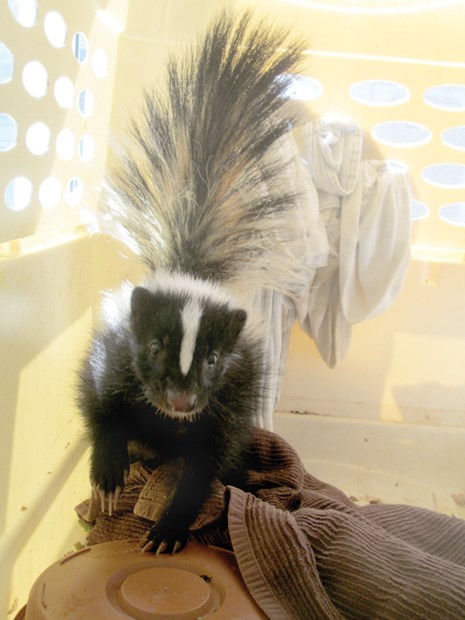A baby skunk stuffed in a tied plastic bag inside a box full of glass and left for dead in a dumpster at Park Royal South last Friday is expected to make a full recovery.
The Good Samaritan who rescued the skunk is Shannon Studer who lives at the Capilano River RV Park adjacent to the mall. The North Shore News wrote a profile last year on Studer who suffers from a hoarding disorder.
Last Friday, Studer peered into her usual dumpster behind Park Royal, and much to her surprise, she saw something out of the ordinary.
“I was looking in that dumpster and I always bird’s-eye-view it — and (the box) moved. And I said, ‘that’s not right.’ But whatever it was I was afraid. I thought, what if it was a snake,” recalled Studer.
Instead, when Studer opened the box she saw a more innocuous creature — but, as everyone knows, skunks can pack a stinky punch.
“I was a little stinky, but that’s alright,” said Studer, who has rescued a total of 45 skunks and raccoons on the North Shore. “The smell always comes out, so it’s not a big deal.”
The skunk was sweating and soaked from fighting to get out of the bag, explains Studer, who wrapped the little guy in a tablecloth and drove him to the Wildlife Rescue Association of B.C. in Burnaby.
“When the skunk arrived, it was cold and wet and spent some time in an incubator. It was otherwise unharmed,” said WRABC spokesperson Yolanda Brooks, who speculated that someone may have intended to kill the skunk.
“That would be my guess. You put it in a dumpster, you obviously want (the skunk) to die. It’s just bizarre,” said Brooks.
“Caleb” the skunk was later transferred to the Critter Care Wildlife Society in Langley where he was treated for slight dehydration. Critter Care staff were expected to release Caleb along with a group of older orphaned skunks into a non-residential area by the weekend.
The wildlife rescue centre reported the Park Royal skunk incident to the B.C. Conservation Officer Service; however, it’s unlikely there will be an investigation.
BC SPCA manager of cruelty investigations Shawn Eccles said conservation officers normally aren’t interested in responding to complaints involving smaller wildlife.
“They are much more interested in the cougars and bears and those sorts of things,” said Eccles.
There are penalties under the Wildlife Act for illegally trapping or hunting an animal, including skunks, depending on the circumstances involved.
Eccles said smaller urban wildlife such as raccoons and skunks are often seen as nuisance animals, but that’s no excuse to treat them inhumanely. When the SPCA operated a shelter on the North Shore, the staff would receive a lot of injured critters that had been trapped by people.
“There is no reason why (skunks and raccoons) shouldn’t be able to live harmoniously with us, although I know there is a lot of people who say, no way.”
To avoid conflict with nuisance urban wildlife the SPCA recommends people remove attractants from their property and properly secure garbage containers.
Some “humane harassment techniques” to get a raccoon out from a garage or attic, for example, include putting up bright lights or talk radio to create an annoyance for the animals.



